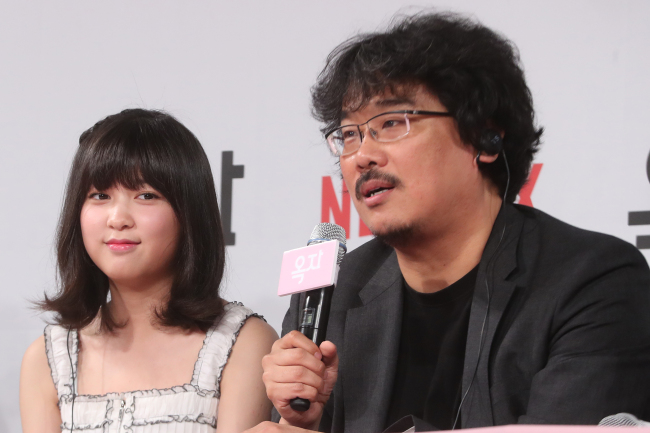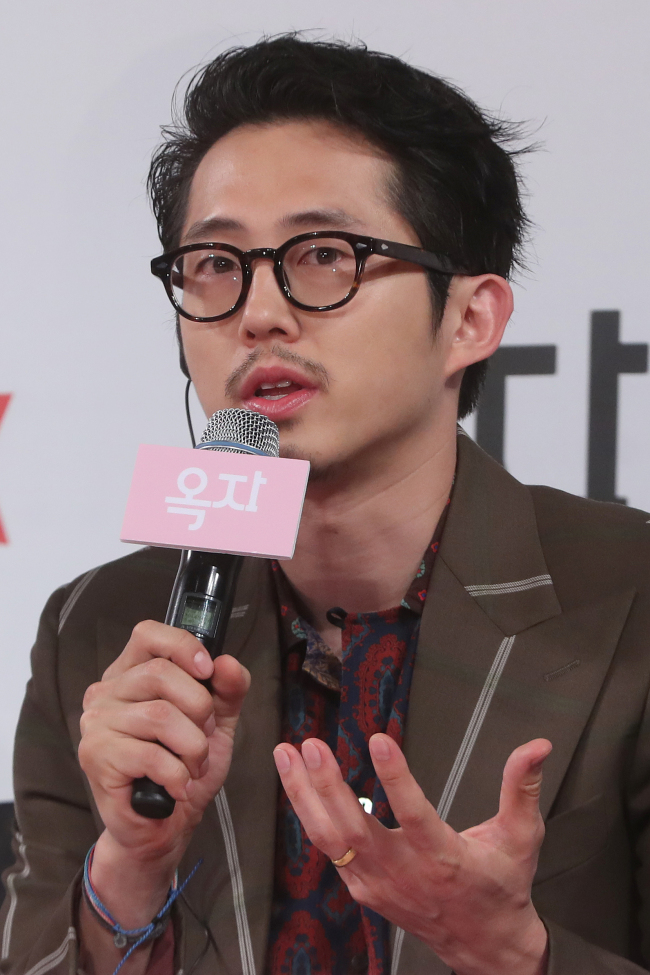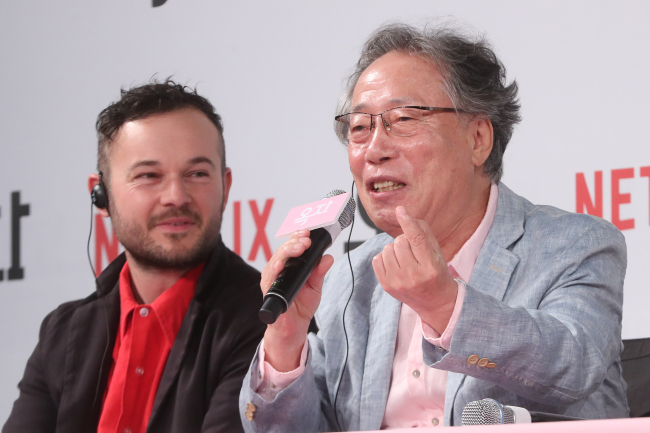Director Bong Joon-ho opened up on the controversy that has been surrounding his film “Okja” and its backer Netflix’s decision to release it simultaneously in theaters and online in Korea, at a press conference in Seoul on Wednesday.
The director assumed responsibility for the kerfuffle in Korea. “I think (this situation) has arisen from my cinematic ambition. Netflix hasn’t tried to push through with theatrical releases (abroad) but Korea is a unique case.
“That is because of me. While filming with (cinematographer Darius Khondji), we wanted as many people as possible in the US, the UK and Korea to be able to see the film on the big screen. It was my greed.”
Major Korean theater chains have been opposing Netflix’s plan for simultaneous online and theatrical release, arguing that customarily, films are screened in theaters for at least a few weeks before becoming available online.
“I fully understand the position of Korean multiplex theaters. ... But I also think Netflix’s principle of simultaneous streaming should be respected. ‘Okja’ has been made with the subscription fees of Netflix viewers and we cannot tell them to wait until after (the movie) has screened in theaters. I respect that.”
The director expressed hope that necessary regulations and systems would be put in place as a result of this controversy.
“I think this film arrived too early, before the rules have been put in place. I hope it will mark the first firing shot of (the implementation) of relevant rules.”

Ahn Seo-hyun (left) and Bong Joon-ho attend a press conference for the film “Okja” at Four Seasons Hotel Seoul on Wednesday. (Yonhap)
Korea’s largest cinema chain CGV has refused to screen the film, while Lotte Cinema and Megabox are still deliberating. However, a number of smaller, independent theaters throughout the country, including Seoul’s Daehan Cinema and Seoul Cinema, have agreed to carry “Okja,” a decision which Bong welcomed.
“It’s an opportunity to visit theaters we’ve forgotten for a while. I’m satisfied with the current situation,” he said. “I hope (the film) will be able to meet you for a long time, even if in fewer places.”
The filmmaker also mentioned the Cannes Film Festival’s mishandling of Netflix movies.
Although the festival invited Netflix films “Okja” and “The Meyerowitz Stories” to compete for the Palme d’Or this year in May, it later announced that movies not planned for theatrical release in France would not be eligible for the award starting 2018. The two Netflix films were not planned for theatrical release in France: Korea, the UK and the US were the only countries where the streaming giant planned both theatrical and online releases.
“(The festival) invited us and then caused a stir, making us embarrassed. They should have put the rules in place and then invited us. How can I as a filmmaker study local French laws while making films?” said Bong.
French laws stipulate movies must wait three years after theatrical release before they can be made available online.
“I think ‘Okja’ contributed as an issue-maker (for the festival), seeing that Lars von Trier was not invited this year,” Bong joked, referring to the Danish director famous for tackling controversial subjects.
“But the situation is different in Korea,” Bong said, admitting that Netflix’s decision went against the existing ecosystem of the Korean film industry.
Bong’s latest creature feature tells the story of country girl Mija on a quest to rescue the gigantic super-pig Okja. For now, the film seems set for a small release at a handful of theaters in Korea, the US and the UK, and Netflix’s international streaming platform on June 29.

Tilda Swinton attends a press conference for the film “Okja” at Four Seasons Hotel Seoul on Wednesday. (Yonhap)
A number of the film’s cast members, also present at the press event, spoke about what the project had meant to them.
Korean-American Steven Yeun, who stars as radical animal-rights activist K, said filming had been a “surreal” experience. K is also a Korean-American character who acts as translator within the film’s multi-ethnic ensemble.
“I literally played K and was K during the film. I’m from (Korea) but I need a translator. ... And in America, there’s the perception that someone who looks like me is not necessarily from there. It’s a lonely middle line that I share with all the immigrants in America.
“(The film) told a unique experience that hasn’t been conveyed in this way before.”

Steven Yeun attends a press conference for the film “Okja” at Four Seasons Hotel Seoul on Wednesday. (Yonhap)
According to British actress Tilda Swinton, who stars as psychopathic CEO Lucy Miranda, the film suggested optimism for human growth.
“(There are) two young creatures at the heart of the film. In many ways it is about growing up. It suggests that when we grow up, we don’t have to give up love, the sense of family, trusting each other, (and) the idea that it’s possible not to tell lies … and survive.”
Giancarlo Esposito, who stars as a top associate in the Mirando corporation, said the film was about “wonder and enchantment” for him.
“Visionary movies allow you to... look deeper inside yourself, and how you want to be toward the world around you.
“There’s hope, reverence for the grand architect of the universe who created this wonderful space for us to play in.”
“We live in an exhausting world that centers on money,” said Bong. “I think (Mija and Okja) show something that cannot be destroyed even today.”

Giancarlo Esposito attends a press conference for the film “Okja” at Four Seasons Hotel Seoul on Wednesday. (Yonhap)

Daniel Henshall (left) and Byun Hee-bong attend a press conference for the film “Okja” at Four Seasons Hotel Seoul on Wednesday. (Yonhap)
Asked why the main protagonist is a young girl, Bong replied, “I think it’s so much more beautiful when little girls show strength, than little boys.”
Ahn Seo-hyun, 13, who portrayed the headstrong Mija, had immediately understood that she was to be the caretaker of the huge creature Okja upon reading the script, Bong said.
The decision to make many of the central characters female, including Okja, was a natural one, Bong said. “I didn’t come at it from a feminist perspective but as the story came together, I realized the main axes had to be women.”
While Okja is a genetic hybrid of an elephant, a hippo and a pig, Bong made her a pig because of what the animal stood for in the food industry.
“When you look at a pig, you think of food, which I think must be unfair for the pig, which is actually a very clean, beautiful and intelligent creature.
“There’s no other animal that symbolizes the duality of animals so well -- their beauty and their food status,” said Bong.
By Rumy Doo (doo@heraldcorp.com)







![[Herald Interview] 'Amid aging population, Korea to invite more young professionals from overseas'](http://res.heraldm.com/phpwas/restmb_idxmake.php?idx=645&simg=/content/image/2024/04/24/20240424050844_0.jpg&u=20240424200058)


